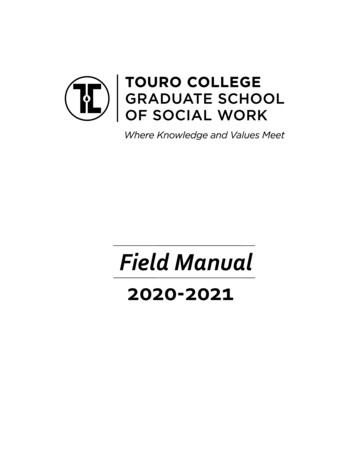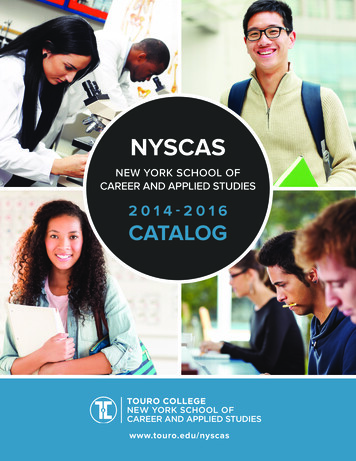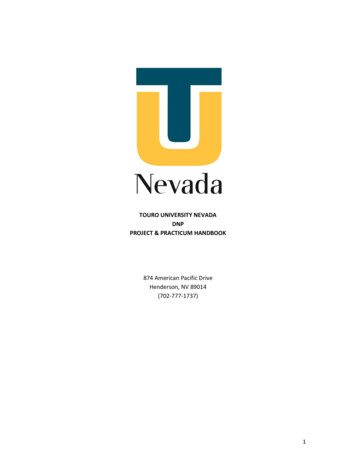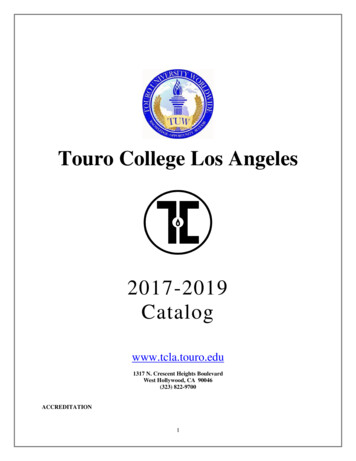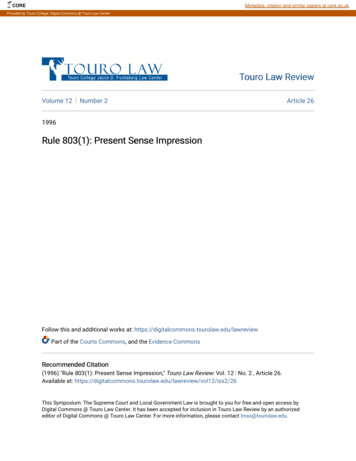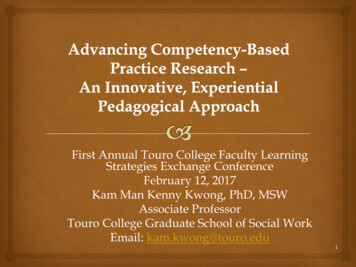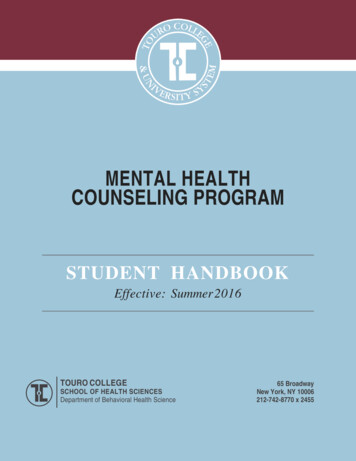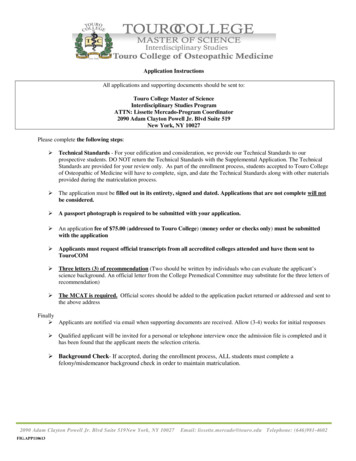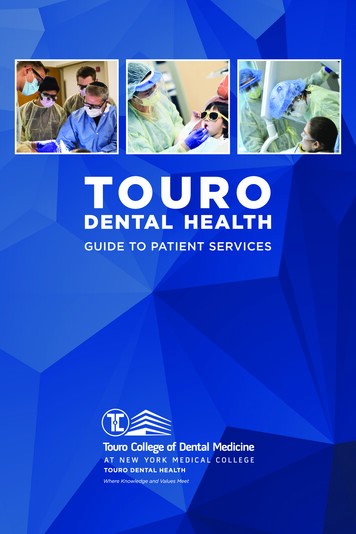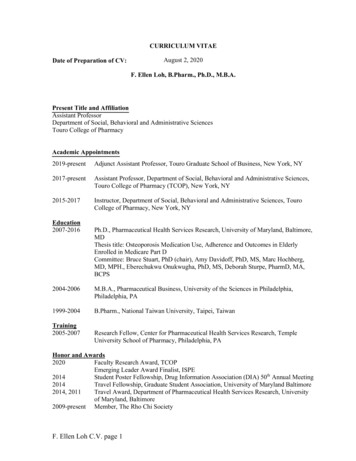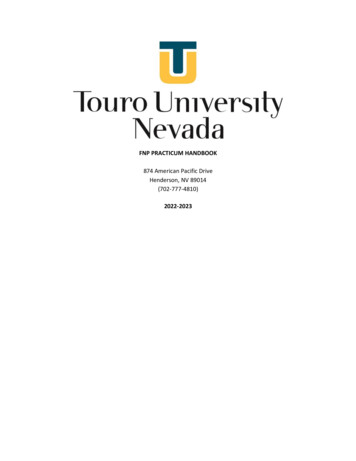
Transcription
FNP PRACTICUM HANDBOOK874 American Pacific DriveHenderson, NV 89014(702-777-4810)2022-2023
TABLE OF CONTENTSTable of ContentsCONTACT INFORMATION. 5INTRODUCTION . 6MISSION and VISION . 6MSN PROGRAM OUTCOMES . 6FNP CURRICULUM. 7COURSE LISTINGS . 8INTERPROFESSIONAL EDUCATION COURSEWORK .11PRACTICA PLACEMENT POLICY .12PRACTICA PLACEMENT: .12PRECEPTOR QUALIFICATIONS: .13INITIATING A PRECEPTOR AGREEMENT or CLINICAL SITE: .13PRECEPTOR & CLINICAL SITE APPROVAL: .13AFFILIATION AGREEMENTS/CONTRACTS: .13STUDENT DOCUMENTATION: .14ACTIVE & UNEMCUMBERED RN LICENSURE: .14BLS CERTIFICATION: .14STUDENT HEALTH INSURANCE: .14STUDENT PROFESSIONAL LIABILITY INSURANCE: .15BACKGROUND CHECK: .15DRUG SCREENING: .15OSHA/HIPAA TRAINING: .15IMMUNIZATIONS & HEALTH RECORDS: .15APEA TESTING .153P Exam (Clinical Readiness Examination): .15National Certification Predictor Examinations: .16PRACTICA PARTICIPATION POLICY .17RULES FOR PARTICIPATION: .17PRACTICUM HOURS & SCHEDULING: .17PRACTICUM LOCATIONS & ALLOCATION: .18CLINICAL SITE ELIGIBILITY FOR A STUDENT’S SITE OF EMPLOYMENT: .19TYPHON CLINICAL TRACKING SYSTEM: .19www3.typhongroup.net/np/data/login.asp?facility 3122 .192Updated May 2022
PRACTICUM ATTENDANCE: .20PRACTICUM ATTIRE: .20FNP STUDENT BADGING & CLINICAL PASSPORT PHOTO REQUIREMENTS: .20FNP STUDENT CLINICAL PASSPORT PHOTO REQUIREMENTS:.20TUN-FNP STUDENT BADGING INSTRUCTIONS .20ithelp@tun.touro.edu .21Non-local Student Badging Instructions: .21ccecchin@touro.edu .21EMPLOYMENT: .22WRITTEN & ELECTRONIC DOCUMENTATION: .22OCCUPATIONAL EXPOSURE: .22PRECEPTOR-STUDENT RELATIONSHIP: .22EVALUATION OF PRECEPTORS & CLINICAL SITES: .23PRACTICA PROGRESSION & EVALUATION POLICY .23CLINICAL HOUR TRACKING: .23DIRECTLY SUPERVISED CLINICAL HOUR COMPLETION: .244MID-TERM STUDENT EVALUATION/SITE VISIT: .25END-OF-TERM STUDENT EVALUATION/OSCE: .25INCOMPLETE GRADE POLICY: .26ALTERNATIVE CURRICULUM PLAN (ACP): .26LEAVE OF ABSENCE: .26EXPECTATIONS OF THE FNP STUDENT IN THE PRACTICA SETTING .277GUIDELINES FOR PRECEPTORS .29PRECEPTOR-STUDENT RELATIONSHIP: .29PRECEPTOR QUALIFICATIONS: .29PRECEPTOR ROLES & RESPONSIBILTIES .300FNP CLINICAL SUPERVISING FACULTY ROLES & RESPONSIBILITIES .31PRACTICUM PLACEMENT SPECIALIST ROLES & RESPONSIBILITIES: .333FNP PROGRAM COORDINATOR ROLES & RESPONSIBILITIES.34Appendix .355CLINICAL SITE REQUEST FORM .355CLINICAL TIME LOG WORKSHEET .366Evaluation of StudentMidterm End of term.41Evaluation of Student – Objective Structured Clinical Evaluation (OSCE) .433PRECEPTOR AGREEMENT FORM.4883Updated May 2022
Student CLINICAL Learning Objectives .49Practicum Placement Plan Q&A .524Updated May 2022
CONTACT INFORMATIONGraduate Nursing DepartmentTouro University Nevada874 American Pacific Dr.Henderson, NV 89014Phone: (702) 777-4810Fax: (702) 777-1747Director School of NursingTheresa Tarrant PhD, RN, CNEAssociate Professor(702) 777-2085ttarrant@touro.eduDirector of Graduate Nursing ProgramsCatie Chung PhD, RN, CNE, PHNAssociate Professor(702) 777-3998cchung6@touro.eduFNP Program CoordinatorPatricia Strobehn PhD, APRN, FNP–BC, ENP-CAssistant Professor(702) 777-3992pstrobeh2@touro.eduPracticum Placement SpecialistChristine Cecchini(702) 777-1737ccecchin@touro.edu5Updated May 2022
INTRODUCTIONThe Family Nurse Practitioner program clinical practicums consist of a minimum of 585 direct patientcare clinical hours over the course of three trimesters. These hours are divided among various clinicallocations and preceptors to meet course objectives and program outcomes. The practicum experience iscompleted along with didactic coursework.MISSION and VISIONVision:The vision of the Touro University Nevada School of Nursing is to foster the development of professionalnurses at all levels that excel in practice, research, education, leadership, and community service.Mission:The mission of the Touro University Nevada School of Nursing is to prepare graduates who demonstrateoutstanding nurse leadership at all levels who uphold the values, philosophy, and practice of the nursingprofession and who are committed to care for patients within an ethical, culturally diverse, andevidenced based framework. The programs are student centered and serve society through practice,research, education, leadership, and community service.MSN PROGRAM OUTCOMESThe graduate will be able to:1. Analyze and synthesize knowledge from nursing and related sciences to design and deliveradvanced, ethical and evidenced based clinical prevention and population care and services fordiverse populations in a variety of care settings.2. Evaluate healthcare policy, regulatory, legal, economic and sociocultural environments to advocatefor patients and affect change in the healthcare system.3. Apply organizational and systems leadership concepts to function as a leader and change agent inone’s nursing specialty.4. Contribute to the development of new knowledge within their specialty area by identifying gaps anddisparities in available evidence and formulating research questions to meet the identifiedknowledge and practice needs.5. Function as a leader while collaborating in inter and intra disciplinary teams to optimize patient andpopulation health outcomes.6. Create a professional development plan to promote the personal and professional growth of oneselfand others that fosters implementation of best practices to ensure optimal patient outcomes.7. Evaluate processes and systems for continuous quality improvement across the care continuum in avariety of settings.8. Participate in development and evaluation of informatics and healthcare technologies forappropriate integration into practice to contribute to enhanced patient safety and care outcomes.6Updated May 2022
FNP CURRICULUMCore Coursework occurs in Trimesters 1-3.FNP Specialty Courses (degree total 53 credits, 585 directly supervised clinical hours):TRIMESTER 3 (3 credits)Course #CourseMSNV 605Pathophysiology Across the Lifespan for Advanced Nursing PracticeTRIMESTER 4 (6 credits)Course #CourseMSNV 620Pharmacology for Advanced Nursing PracticeMSNV 621Physical Assessment for Advanced Nursing PracticeMSNV 622Physical Assessment for Advanced Nursing Practice Practicum (45 hours onlinesimulation)TRIMESTER 5 (10 credits)Course #CourseMSNV 623Primary Care and Differential Diagnosis (135 directly supervised clinical hours)MSNV 624Primary Care Adult Practicum & SeminarMSNV 625Primary Care for Disease Prevention & Wellness (45 directly supervised clinicalhours)MSNV 626Primary Care for Disease Prevention & Wellness PracticumMSNV 627Clinical Intensive I (on campus, 3 days)TRIMESTER 6 (10 credits)Course #CourseMSNV 628Primary Care of Childbearing Families & ChildrenMSNV 629Primary Care of Childbearing Families & Children Practicum (135 directlysupervised clinical hours)MSNV 630Primary Care of Mental Health Across the LifespanMSNV 631MSNV 632CreditsPrimary Care of Mental Health Across the Lifespan Practicum (45 directlysupervised clinical hours)Clinical Intensive II (on campus, 3 days)TRIMESTER 7 (9 credits)Course #CourseMSNV 633Primary Care of the Aging AdultMSNV 634Primary Care of the Family Practicum (225 directly supervised clinical hours)MSNV 636Clinical Intensive III (on campus, 3 days)MSNV 637Capstone (includes preparation for national certification 17Updated May 2022
COURSE LISTINGSBSNV 499 New Student Orientation (0 credits)All nursing students should start with this Canvas Student Orientation course! This course will introduceyou to the School of Nursing and the nursing programs at Touro University Nevada. This interactivecourse details the Canvas learning management system and how to use Canvas in your program. Topicscovered include: where to find course information, how to participate in online discussions, how tosubmit assignments in Canvas, and how to use the TUN library. You will also have the opportunity tointeract with other new nursing students at all program levels. Please access this course prior to thestart of your first term at TUN.MSNV 600 Value-driven Leadership Roles and Implications for Care (3 Credits)This course introduces the student to healthcare leadership. Emphasis includes nursing opportunitiesfor leadership in various roles and at multiple levels of the organization. Content includes leadershiptheories, nursing contributions to the organization, stakeholder/agency partnerships, and resultingoutcomes. Change processes and strategies in healthcare will be discussed. Both clinical and non-clinicalnursing leadership roles are detailed in the context of the current healthcare environment.MSNV 601 Research and Ethics in Advanced Practice Nursing (3 Credits)This course emphasizes nursing’s increasing scope of utilizing evidence to support practice, education,and the development of further evidence through research. Emphasis includes understanding statisticsas they are reported in the nursing literature, and the associated implications for practice. Analysis ofresearch frameworks to examine nursing issues will occur. Ethics related to research processes andutilizing the evidence base will be explored.MSNV 602 Theoretical Applications in Advanced Nursing Practice Roles (3 Credits)This course allows for critical analysis and evaluation of multiple theories utilized in nursing educationand practice. Examines how different theories and models serve the profession and, ultimately, guideunderstanding of practice and outcomes. Theories examined will include the scope of grand nursingtheories, middle range theories, and practice theories and models.MSNV 603 Systems, Policy, & Contextualization: Impact on Healthcare (3 Credits)This course describes the U.S. healthcare system and current policies. The associated organizational,social, legal, regulatory, and legislative factors that influence policy development and implementationwill be explored. Policies significantly affecting nursing practice, such as the Patient Protection andAffordable Care Act, will be emphasized. The healthcare and educational system’s responses to currenthealth policies will be compared and contrasted.MSNV 604 Cultural Understanding and Population Health (3 Credits)This course demonstrates the impact nursing has on population health. Cultural understanding will beemphasized as a skill needed to aid in quality interpretation of epidemiological data. The course will alsodevelop skills used in building health promotion programs for populationsMSNV 605 Pathophysiology Across the Lifespan for Advanced Nursing Practice (3 Credits)This course focuses on the physiologic mechanisms and pathophysiology of human body systemsincluding both adaptive and maladaptive changes that occur throughout the lifespan. Pathophysiology offrequently encountered primary care conditions across the lifespan and special populations will beexamined. This course provides foundational content for all future clinical courses. Content is presented awithin a holistic, culturally competent and evidenced based framework.8Updated May 2022
MSNV 620 Pharmacology for Advanced Nursing Practice (3 Credits)This course emphasizes the development of pharmacological knowledge required for an advancedpractice nurse to treat and care for patients. Students will analyze and synthesize clinicalpharmacokinetics and pharmacodynamics concepts in the management of common disease processesoccurring in patients across the lifespan.Pre-requisite: MSNV 605 or credit may be awarded by previous coursework.MSNV 621 Physical Assessment for Advanced Nursing Practice (2 Credits)This course builds on the students' knowledge and physical assessment skills and provides a foundationfor the advanced practice nurse to evaluate the health of individuals. Emphasis is on advancedassessment including advanced communication (i.e., clinical interviewing, focused history taking),biopsychosocial and physical assessment, critical diagnostic reasoning, and clinical decision-making skillsrequired to diagnose and treat individuals across the lifespan.Pre-requisite: MSNV 605 or credit may be awarded by previous coursework.Co-requisite: MSNV 622MSNV 622 Physical Assessment for Advanced Nursing Practice Practicum (1 Credit)This course is a lab that accompanies NUR and provides the student the opportunity to apply advancedassessment skills. There is an emphasis on history taking, physical examination and acquiring andanalyzing diagnostic data within a holistic, culturally competent framework and evidenced basedframework. Course requires 45 hours of online simulation.Pre-requisite: MSNV 605 or credit may be awarded by previous coursework.Co-requisite: MSNV 621MSNV 623 Primary Care and Differential Diagnosis (3 Credits)This course focuses on synthesizing knowledge from pathophysiology, assessment techniques and otherprevious courses to provide appropriate differential diagnosis and interventions in a primary careenvironment. The content is presented within a holistic and culturally competent framework andevidenced based framework.Pre-requisite: MSNV 605, 620, 621, 622 or credit may be awarded by previous coursework.Co-requisite: MSNV 624, 627MSNV 624 Primary Care Adult Practicum (3 Credits)This practicum accompanies MSNV 623 and focuses on students applying theoretical and clinicalconcepts related to health assessment and differential diagnosis in the adult health population. Thecontent is presented within a holistic, culturally competent framework and evidenced based framework.Course requires 135 hours of directly supervised clinical hours.Pre-requisite: MSNV 605, 620, 621, 622 or credit may be awarded by previous coursework.Co-requisite: MSNV 623, 627MSNV 625 Primary Care for Disease Prevention & Wellness (2 Credits)This course focuses on the theoretical and clinical concepts related health promotion and diseaseprevention in a primary care environment. Both disease prevention and health promotion are presentedwithin a holistic, culturally competent framework and evidenced based frameworkPre-requisite: MSNV 605, 620, 621, 622 or credit may be awarded by previous coursework.Co-requisite: MSNV 626, 627MSNV 626 Primary Care for Disease Prevention & Wellness Practicum (1 Credit)This practicum accompanies MSNV 625 and focuses on students applying theoretical and clinicalconcepts related health promotion and disease prevention in a primary care environment. Both diseaseprevention and health promotion are presented within a holistic, culturally competent framework andevidenced based framework. Course requires 45 hours of directly supervised clinical hours.9Updated May 2022
Pre-requisite: MSNV 605, 620, 621, 622 or credit may be awarded by previous coursework.Co-requisite: MSNV 625, 627MSNV 627 Clinical Intensive I (1 Credit)This is the first of three clinical intensive experiences that focuses the NP student on application anddevelopment of primary assessment and diagnostic skills needed to care for patients across the lifespan.Clinical experiences will be chosen to allow the student the opportunity to apply, develop and broadennurse practitioner skills. On-campus.Pre-requisite: MSNV 605, 620, 621, 622 or credit may be awarded by previous coursework.Co-requisite: MSNV 623, 624, 625, 626MSNV 628 Primary Care of Childbearing Families & Children (2 Credits)This course prepares the Nurse Practitioner to provide holistic family-centered care during thechildbearing years. Focus is on comprehensive assessment, intervention and preventive care for womenand families throughout reproductive and childrearing years. Students will further develop their skillsrelated to health promotion, prevention of illness, diagnosis, and management of health problemscommonly experienced. Content will include management of both normal and pathological conditions.Pre-requisite: MSNV 623, 624, 625, 626, 627Co-requisite: MSNV 629, 632MSNV 629 Primary Care of Childbearing Families & Children Practicum (3 Credits)This practicum accompanies MSNV 628 and focuses on students applying theoretical and clinicalconcepts related to provide holistic family-centered care during the childbearing years. Students willfurther develop their skills related to health promotion, prevention of illness, diagnosis, andmanagement of health problems commonly experienced. Course requires 135 hours of directlysupervised clinical hours.Pre-requisite: MSNV 623, 624, 625, 626, 627Co-requisite: MSNV 628, 632MSNV 630 Primary Care of Mental Health across the Lifespan (2 Credits)This course prepares the Nurse Practitioner to provide for holistic care mental health care needs ofindividual and families across the lifespan. Focus is on comprehensive assessment, intervention andpreventive care in a variety of patient settings. Content will include management of both normal andpathological conditions. Students will further develop their skills related to health promotion,prevention of illness, diagnosis, and management of health problems commonly experienced.Pre-requisite: MSNV 623, 624, 625, 626, 627Co-requisite: MSNV 631, 632MSNV 631 Primary Care of Mental Health across the Lifespan Practicum (2 Credits)This practicum accompanies MSNV 630 and allow for the NP student to apply theoretical and clinicalconcepts needed to provide mental health care needs across the lifespan. Focus is on comprehensiveassessment, intervention and preventive care in a variety of patient settings. Content will includemanagement of both normal and pathological conditions. Students will further develop their skillsrelated to health promotion, prevention of illness, diagnosis, and management of health problemscommonly experienced. Course requires 45 hours of directly supervised clinical hours.Pre-requisite: MSNV 623, 624, 625, 626, 627Co-requisite: MSNV 630, 632MSNV 632 Clinical Intensive II (1 Credit)This is the second of three clinical intensive experiences that focuses the NP student on application anddevelopment of primary assessment and diagnostic skills needed to care for patients across the lifespan.Clinical experiences will be chosen to allow the student the opportunity to apply, develop and broadennurse practitioner skills. On-campus.10Updated May 2022
Pre-requisite: MSNV 623, 624, 625, 626, 627Co-requisite: MSNV 628, 629, 630, 631MSNV 633 Primary Care of the Aging Adult (2 Credits)This course prepares the Nurse Practitioner to provide for the unique health care needs of the agingadult. Focus is on comprehensive assessment, intervention and preventive care in a variety of patientsettings. Content will include management of both normal and pathological conditions. Students willfurther develop their skills related to health promotion, prevention of illness, diagnosis, andmanagement of health problems commonly experienced.Pre-requisite: MSNV 628, 629, 630, 631, 632Co-requisite: MSNV 634, 636, 637MSNV 634 Primary Care of the Family Practicum (5 Credits)This practicum allows the NP student to apply both theoretical and clinical concepts to the primaryhealth care needs of patients across the lifespan within a safe, culturally competent, evidenced basedframework. Emphasizes achieving clinical competence in collaboration with other healthcareprofessionals. Course requires 225 hours of directly supervised clinical hours.Pre-requisite: MSNV 628, 629, 630, 631, 632Co-requisite: MSNV 633, 636, 637MSNV 636 Clinical Intensive III (1 Credit)This is the third of three clinical intensive experiences that focuses the NP student on application anddevelopment of primary assessment and diagnostic skills needed to care for patients across the lifespan.Clinical experiences will be chosen to allow the student the opportunity to apply, develop and broadennurse practitioner skills. As the final clinical intensive this course synthesizes and integrates knowledgefrom previous courses. On-campus.Pre-requisite: MSNV 628, 629, 630, 631, 632Co-requisite: MSNV 633, 634, 637MSNV 637 Capstone (1 Credit)The course serves as a review of all program content to prepare the NP student for the certificationexam. The content will also include exploration of the certification exam requirements and the testblueprint.Pre-requisite: MSNV 628, 629, 630, 631, 632Co-requisite: MSNV 633, 634, 636MSNV 699 Nursing Independent Study (1 – 5 credits)Students work with Nursing Faculty to meet individualized student learning objectives.INTERPROFESSIONAL EDUCATION COURSEWORKAll MSN degree seeking nursing students are required to complete the following no credit no chargecourses.IPEV 701 Interprofessional Competencies (0 credits)This course(s) introduces students to the Core Competencies for Interprofessional CollaborativePractice. Students will become familiar with the Core Competencies and participate in a variety oflearning activities examining the following interprofessional themes: professional roles andresponsibilities, communication, values/ethics, and teamwork. This is a required course(s) for degreeseeking students admitted to Touro University Nevada Summer 2017 and beyond.IPEV 702 Interprofessional Activities (0 credits)11Updated May 2022
This course develops student skills and abilities related to the Core Competencies for InterprofessionalCollaborative Practice. Students apply the core competencies from the framework of their chosenprofession to a variety of interprofessional learning activities. Learning activities may include:simulation, unfolding case studies, small group discussions, or events with TUN communitypartners. Activities may take place via a variety of in-person and virtual methods. Students thenanalyze and evaluate the interprofessional processes that occurred during the learning activities. This isa required course(s) for degree-seeking students admitted to Touro University Nevada Summer 2017and beyond.PRACTICA PLACEMENT POLICYPRACTICA PLACEMENT:Students are generally in the best position to identify and secure clinical preceptors and practice siteswithin the community that will provide them with optimal learning experiences. As a part of studentprofessional development, students must proactively engage their community providers for potentialpartnership related to their practicum placement. Placement is to be secured through partnership withthe school of nursing, students, preceptors, and the clinical site.When possible, it is the intent of the program to have students contribute to and coordinate clinicalplacement that will best fit the student’s needs and individual circumstances. Touro University Nevadacannot guarantee clinical placement. It is critical that the student identifies and formalizesarrangements prior to scheduled practicum experiences.Upon entry to the program students are responsible to submit a Practicum Placement Plan (PPP) nolater than day 7 of week 8 in each trimester. As FNP students matriculate through the program, they willbe required to turn in an updated PPP every trimester in order to ensure students are actively seekingout preceptor opportunities in preparation for practica coursework.To
MSVN 634 Primary Care of the Family Practicum (225 hours: 140 hours primary care and 85 hours of primary care or specialty) Primary Care Ex: Clinics, Primary Care, Family Practice, Internal Medicine, Mobile Health, Tele-health, Community based or private offices. Trimester 7 students are highly encouraged to select a different
